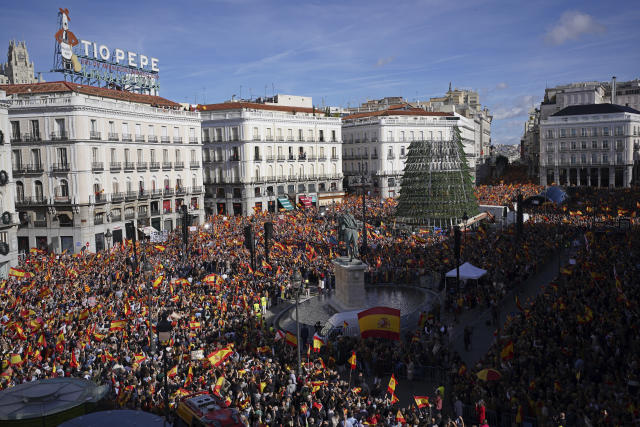By John Hird and Marisa Cabal, Alternativa Socialista — our sister organisation in the Spanish State
After months of political manoeuvring and right-wing protests Pedro Sánchez, the PSOE leader has finally formed a government three months after the general election which marked a stalemate and polarisation in the Spanish state.
The traditional right wing Popular Party (PP) received the most votes in the elections but failed to get enough support to form a government, partially because of its alliances with the far-right Vox party. The leader of the PP, Alberto Núñez Feijóo, was invited to form a government but failed to reach the threshold. Pedro Sánchez then embarked on a series of negotiations with smaller parties including Catalan and Basque nationalist and pro-independence parties.
Sánchez’s Socialists signed a Catalan Amnesty deal with two key Catalan independence parties that command 14 votes in Congress that proposes to “clean the slate” for over 400 Catalan politicians and civic leaders who were jailed by the Spanish state and given massive fines in 2017 following the independence referendum.
Let’s remember that on the 1st of October 2017, people faced brutal police violence to protect ballot boxes and keep schools open for voting. More than 2.200.000 people participated and 90% of the votes were in favor of a Catalan Republic. Beyond the figures, the ability of workers and young people to defend their fundamental rights is of particular interest, which was confirmed in the historic general strike of the 3rd October.
The deal does not recognise the result of the referendum or the right to self-determination. It does however represent a capitulation of the petit-bourgeois pro-independence Catalan parties, which took over the leadership of the massive movement in Catalonia. They are entering the ‘normal’ capitalist order again, after supposedly “going astray”.
The deal in itself has limits and raises several question marks. The 400 people who will benefit from the Amnesty is a low number compared to the amount of repression since 2012. The fines that have been already paid will not be returned. The law will also benefit police officers who are charged with using excessive violence and causing injuries to demonstrators.
The right-.wing bloc including the PP and far-right Vox have refused to accept the result and have sought to de-legitimatise and destabilise the new government and Amnesty deal and launched a civil disobedience campaign.
The leader of the ultranationalist Vox party, Santiago Abascal, compared Sánchez with Hitler in parliament, claiming that the Socialist leader is carrying out a coup d’état and requesting that his partner in regional and municipal governments, the PP, use its majority in the Senate to lead the upper house into insubordination and refuse to process the clemency measures. He also urged the PP to encourage the illegalisation of the Catalan parties ERC and Junts.
The PP called for massive demonstrations in several cities against the Amnesty deal. At the same time, daily demonstrations were organised by Vox and far-right groups outside PSOE’s Madrid HQ which resulted in clashes with the police. Although the PP is not formally organizing these ultra-right demos, it is reluctant to condemn them. Furthermore, it is playing with an incendiary discourse. On the day of Sanchez’s investiture the Congress of Deputies was surrounded by security forces. Feijóo had accused Sánchez of corruption and political fraud but was forced to admit, “this is a legitimate majority for an investiture.”
This statement marks the difference and limits for the dangerous game of political hyperbole the PP is playing with Vox. One of the reasons the PP failed to gain a workable majority in the general election was the fear and opposition of the working class and young people to a government which included the far-right Vox.
The actions of the PP and Vox since the election has further polarised the situation. Every kind of fascist grouplet has turned up on the anti-amnesty demonstrations.There were fascist hymns, Francoist symbols and racist slogans. They used inflatable dolls to insult PSOE’s women ministers, good company for former Fox News host and Trump supporter Tucker Carlson who also showed up. The confused nature and very often incoherent statements of many on the demos marks a deepening of the ‘Trumpisation’ of the Spanish right-wing.
A group of retired military personnel asked the Army to dismiss Pedro Sánchez. The Spanish Military Association (AME) circulated a letter in which 51 retired chiefs and officers asked their active colleagues in the Armed Forces to dismiss the President of the Government, Pedro Sánchez.
Both the PP and Vox have pledged to block the Amnesty law in the Constitutional court. Members of the body that picks top judges, the General Council of the Judiciary, have already backed the PP and Vox position on the Amnesty. A High Court judge in Madrid announced he would investigate Puigdemont, the ex — President of Catalonia who made the short-lived declaration of independence in 2017, and close colleagues over possible terrorism charges which, if they led to a conviction, could put them outside the remit of any amnesty.
Sánchez has achieved a fragile majority with the support of the new left coalition, Sumar. As we pointed out after the elections, “SUMAR was formed as a vehicle to continue the parliamentary careers of Podemos and IU deputies, who, when in coalition with PSOE, suffered a massive drop in support due to not implementing their 2019 promises.
Alternativa Socialista (ISA in the Spanish State) opposed Podemos and IU entering into a coalition with PSOEat the time. We urged that they instead support the formation of minority PSOE administration, to have the freedom to criticise the government from the left and fight for change qnd against the right based on mass mobilisation and organization.
Unfortunately, being part of the coalition has almost wrecked the Podemos project. Pablo Iglesias retired from politics and the working class is skeptical about the commitment to real change of the ‘parliamentary comrades’.
Yolanda Diez and Sumar have managed to outmaneuver Podemos and they will remain outside of the government while Sumar will have five ministers.
Sánchez talks about holding back the right but in reality there is little on offer to the working class. A vice-president of the government, Nadia Calviño, who is running for president of the European Investment Bank (EIB), will be the head of the Ministry of Economy, Trade and Enterprise, from where she will continue to apply the policy of bailing out companies at the expense of workers’ pockets.
Strict fiscal discipline will be imposed by the return of the rules suspended by Brussels since the pandemic. The International Monetary Fund predicts an economic slowdown in 2024 with a fall in GDP of up to 1.7%. Calviño is expected to propose deep cuts. Sánchez already submitted to the EU, shortly before the elections, commitments to make cuts of at least 20 billion euros to start adjusting to the EU’s fiscal discipline.
In the previous government of PSOE, Calviño was responsible for one of the most militaristic General Budgets in the last 40 years, with a 26% increase in military spending, while the increase in spending on public services did not even compensate for the rise in inflation. This military expenditure was not only used to intervene militarily in Ukraine, but also prepared new conflicts such as the current one in Palestine and the discriminatory migratory policy on the border with Morocco. The Spanish government has maintained economic and arms agreements with the State of Israel, which it refuses to dismantle, despite the mass murder being committed against the Palestinian people.
The continuation of the Defence and Foreign Affairs ministers shows the pro-NATO and militaristic policies will continue.
Fernando Grande-Marlaska will remain Minister of the Interior, despite being responsible for some of the most reactionary policies of the PSOE Government. He is co-responsible for the massacre in Melilla in the summer of 2022 in which Spanish security forces and Moroccan gendarmerie killed more than 30 migrants in the border area as reported by ASI at the time. Amnesty International concluded that Spain and Morocco committed “crimes under international law” in Melilla.
The policies of PSOE while in power and the fatal mistake of Podemos and IU of giving Sánchez a left cover by joining the government are in the main responsible for the unprecedented rise of the PP and ultra right.
PSOE along with the PP and the ultra-right opposed the Catalan referendum in 2017. Disgracefully, they marched alongside the PP and Vox in the streets of Barcelona against the Catalan people’s right to decide and supported Rajoy’s application of the infamous Article 155, which suspended Catalan autonomy. They also encouraged the most savage police repression against mass mobilisations in protest against the Supreme Court ruling and the imprisonment of pro-independence leaders.
The parliamentary ‘left’ around Sumar and Podemos show no signs of learning from their mistakes or indeed history. The coalition Sánchez has managed to cobble together, supposedly as a protection against the ultra-right, includes Junts, the Catalan nationalist right wing, and PNV, the Basque nationalist right wing will be precarious and will not stop an emboldened ultra-right. Vox, through their misnamed yellow “union”, ‘Solidaridad’ called a reactionary “general strike” on November 24th against the Amnesty.
Lamentably, the ‘left’ are obsessed with demobilising the working class and youth,after being given their ministries and having sworn allegiance to the constitution and the King. The serious rise of the ultra-right and their continuous mobilisations shows how much they respect polite parliamentary procedure.
The political situation in the Spanish state continues to be volatile and polarised and the mobilisation of the ultra-right, after they had their fingertips on power, marks a deepening of the political crisis.
Time and time again the working class and youth have shown they are prepared to struggle in defence of education, the health service, in defence of pensions, against cuts and in favour of the right to self-determination in the historic nations of the Spanish state. In the last few weeks masses of people have filled the plazas in support of the Palestinian people, yet the parliamentary ‘left’ are incredibly trying to demobilise the protests!
In recent years women have risen against sexist violence in magnificent mobilisations which have shaken the Spanish state.
The national questions ebb and flow. The Catalan and Basque questions are back on the agenda. The explosive ingredient in the mix is the rise of the ultra-right. A combination of intertwining and overlapping struggles are all possible. Above all, the task before socialists is to unite around a programme to benefit women, youth, the working class and support the right to self-determination. Such a programme has to be fought for on the streets and in the working class barrios. The reduction of the fight for a new and better society to mere parliamentary debates would be a fatal mistake for the left, as history has shown us in the Spanish state.












